remembering my father
2023.07.28 (updated : 2023.08.27)
My father, Helmut Werneburg, died this morning by a scheduled injection administered by a nurse. He requested this end after lung cancer had made his life a living hell. He was eighty-four years old and had long since made all the arrangements for the coming end.
When I look back, I see that my parents kicked off several of my life-long interests over the years. My parents inspired my interest in the natural world, but my father was the one who started my interest in geography through things like meteorology and maps and explaining the landforms around us. I was hooked at an early age by what I saw through his eyes as a glider pilot and did my first degree in Geography.
I also followed his lead in photography, and he and my mother encouraged my interest in writing. The interest in writing was supported by a typewriter I received for Christmas around 1978. My photography started with various cheap pieces from both grandfathers but my first "real camera" was my father's old Minolta SRT-101 that made me a Minolta user - and an almost daily photographer - to this day.
My father's travels were an inspiration, and my father's moving to a new country at seventeen was something I would follow myself (I'm currently on my third stint of living abroad).
And then there were the computers. Each of my parents brought home personal computers at some point. From my mother, it was a Commodore 64. My father ordered a Sinclair kit that was more or less a toy, but it really taught you how the components went together. On one I learned to program, from the other I learned how hardware mattered. My father brought home IBM PC's at different points, and he also helped me buy my first PC while visiting me during my first year of university.
I don't know if I would have found these things on my own, but they've remained my main interests. I wrote the software that runs this website, I wrote all the content and took all the photos, and I built it on hardware that I assembled. I've made my living in technology, a thirty-year run that enabled the remote living.
I was lucky enough to see him one last time just these past couple of weeks. He was, of course, a shadow of his former self and he couldn't stand prolonged visits. We had a only small and innocuous interactions over the ten days I was in town, and I was able to run some errands. Honestly, it was all a year or two late. The superficial nature of our interactions reflected our relationship throughout my adult life. He was a very walled-off person, sharing very little about his life and expressing no emotions other than perhaps anger and resentment. As a friend pointed out, you just have to accept your parents for their flaws and keeping my father's emotional limitations in mind was a cornerstone of my relationship with him.
accepting the man
My father was born in Germany six months before World War II was also born there. A lot of his personality was shaped from his childhood, which sounds like it was hell. He shared virtually nothing of life with me directly, but my Oma (grandmother) shared some things with my mother that got to me. He spent his early life in bomb shelters and then the occupation.
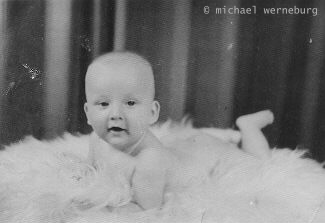
His father was a violent, alcoholic tyrant who did what he could but those years instilled in my father many unhelpful resentments and self-imposed limitations. The war years were of course really bad, and included the death of my father's only sister at the age of a month in 1944. No one ever told me that story, I suppose I'll never know. The post-war years in Hanover saw the necessary rebuilding of a city that had been completely flattened. The economy was so poor that my father had to leave school before completing high school in order to bring in income.
In fact, he'd been working from an early age. It was of that time that I heard one of the few stories of his life. He said, "When I was twelve, I had a job watching bricks dry," he told me. Expecting a story about the value of work or something of that nature, I was surprised when he concluded, "it was boring as hell." I only heard half a dozen stories from the man about his entire life, and I only heard that one once.
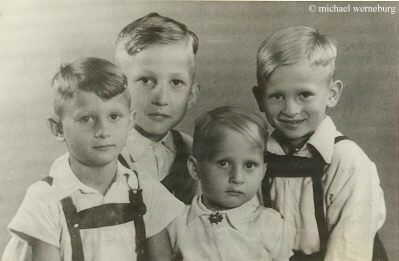
So he struggled with problems not of his making, and then became an immigrant to a new land, Canada. At that time, Canada didn't like Germans but found itself flush with them. The family worked as itinerant farm labor for several years. My father became an electrician by trade, and also leased a fruit farm where his parents hired seasonal labor to produce apples, peaches, wine grapes, and many other fruits and berries. He'd married my mother by the beginning of the seventies and I came along immediately - and I mean immediately - after. An electrician could make good money in the sixties in Canada, and he had quite a variety of interesting jobs including working on the ships that plied the Laurentian Great Lakes. I recall vividly that he was on one of them when the Edmond Fitzgerald sank in 1975 and my mother was glued to the radio. As a working-class immigrant, he perhaps learned a new set of resentments.
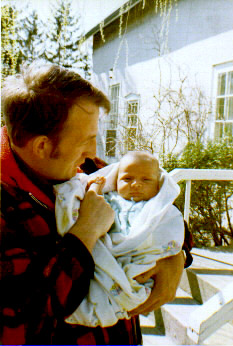
Work was a constant factor in his life, managing a productive farm and taking jobs as a freelance electrician throughout the seventies, then moving into permanent positions throughout the eighties and nineties. I don't think he ever really had a break until he retired. He passed the exams to become a master electrician when I was in high school; I can still recall his putting in the endless hours, working with books but also hands-on equipment. Many years later, I would find myself doing a masters degree at around the same age - mid-to-late forties - and I would remember his being a better student at that age than I was in high school.
the famous glider pilot
All of this is not to say that he didn't have time for his life outside of work. He was a champion glider pilot, and as of his death retains Canadian records in soaring:
- 803.7km triangle from 1982, which was the SAC "flight of the year" and for which he was awarded the perhaps problematic "Ball and Chain" award for pilots who succeeded despite being married.
- 300km out & return speed record from 1983
He won his first mention at national competitions in 1965 as "best novice",then in 1966 as the junior partner to Peter Trounce, with whom my father remained friends until Peter died in 2017. He was runner-up at the national competition in 1972, winning the "The Hawkesbury Chamber of Commerce trophy" for that showing. My father won national championships 1973, 1977, 1979, and 1980. (After that his brother Ulli won some eight times over the next twenty years.) He competed internationally as well, and was in Canada awarded the Wolf Mix award for outstanding achievement in international competition in 1973 and 1977. In 1983, he finished 9th in the world competitions in his class.
All of his competing was very exciting for my brother and me. We didn't know any other dads that were competing in something internationally. And we got t-shirts!
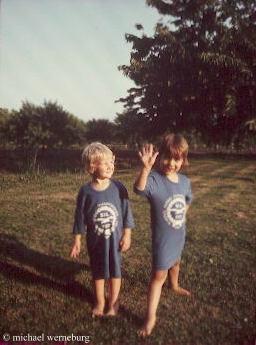
My uncle submitted the following memorial to the Soaring Association of Southern Ontario, the Toronto-area gliding club that my father helped found in the 1960s:
"Final Glide - Hal Werneburg
I am sad to report that my brother, Hal (Helmut) Werneburg, passed away this week after a short battle with cancer.
Hal was an outstanding pilot, both in gliders and power aircraft, but was particularly successful in soaring competitions and record flying. He was a long time member of SOSA Gliding Club where he began his gliding career at Brantford in 1961. In a succession of different gliders, starting with a Schleicher Ka 3, a Schleicher Ka 8b, to a Std. Cirrus, Mini-Nimbus and then Ventus he made many exceptional flights in southern Ontario and later in southern Alberta.
In Ontario, he pioneered use of the lake breeze effect off Lake Erie and made many plus 500km out and return flights in the Std. Cirrus and the Mini-Nimbus. In Alberta, flying from CuNimb, he made many long flights including an 803km FAI triangle flight with his Mini-Nimbus which is still a Canadian record today, 41 years later.
However, Hal was equally accomplished as a competition pilot. He won 4 Canadian championships in the Standard and 15m racing classes and had many other top finishes. He represented Canada 4 times at World Championships, achieving a 9th place finish at the 1983 competition at Hobbs, New Mexico, flying his Ventus B.
In later years he did a lot of towing and enjoyed soaring competitions in that way. His employer made a number of attempts to infringe on his free time with shall we say mixed results.
Hal was a great teacher and mentor for me, in life and in soaring, making an indelible impression with his calm, positive and determined attitude. He contributed a lot to soaring in Canada, as an instructor, tow pilot and as the long time FAI representative for the Soaring Association of Canada. He was always generous in sharing his wealth of knowledge and experience with up and coming pilots. Write-ups of some of his exploits can be found within the pages of “Free-Flight” and they make for fascinating reading.
He was an enthusiastic, dedicated and long time member of the Canadian soaring community whose accomplishments and contributions will be well remembered."
the contradiction
One of the curious things about my father was that someone who spent so much of his life raising hell - at home, at work, and in his day to day interactions - was always viewed as so "easygoing" at the gliding club. That was the word we'd always hear from the gliding crowd and it was mystifying to me. I worked with him for two summers in my student days. He had such poor relationship at work that I heard things like, "You'll regret this, Werneburg!" and "No offense, Michael, but your Dad is a real piece of work." His employer would, at one point, bring in a psychologist, and someone informed my mother that it was because of Dad.
He was so impatient and irritable that we would have poor chances of actually eating should we go to a restaurant. We'd be seated, we'd probably have ordered, but something would go wrong and Dad would be in a fit before we'd eaten. On these occasions, he'd storm out and the rest of us would follow. I once saw him so agitated in a restaurant that he couldn't sit with us and he paced around the booth the entire time. He would have been in his early sixties at that point.
And at home; where do I start! My teen years were spent with worsening problems at home, in which my father had left no stone un-turned in his mis-handling of the situation. For a taste of his parenting style, I'll submit the following Twisted Sister video.
Whoever wrote that bit, well they knew. At some point in the late seventies, my father would start ranting about how none of us - his thirty-year-old wife who was raising two kids aged 7 and 5 - would amount to anything and how weak we were. It escalated over the years in many ways, so that morning greetings were wary and the only respite in the day was the time after we got home and before he did. This was the brief time when we could see our friends. When he drove up the driveway, they'd bolt through the front door. As he'd enter the back door, they'd circle the house to get their bikes, then they'd be off. Then dinner would invariably be tense and the nights would be marked by screaming. There was a lot going on between my parents, and while I was marked for mostly verbal/psychological abuse, between my father and brother it was like a running war. My final year of high school was in a state of constant tension and trepidation. I decided to go to university, and my mother arranged for me to stay with her father and step-mother in St Catharines, Ontario. Starting university on my own in a new province knowing nobody and nothing was a bit tense, but nowhere near a Friday night or Saturday or Sunday at my house.
I think that PTSD was likely a big factor in all of this, and quite possibly also "burnout" from work (real burnout, not just being overwhelmed). Both of these are difficult to live with and he did not have the resources to deal with them. And so it would go, worsening year by year.
As adults, we made the effort to get together periodically, with mixed success. I wouldn't see too much of the old man, with two long stretches of no in-person interaction even running to five and two-and-a-half years, respectively. It was the same for my brother. There wasn't much my brother or I could discuss without his becoming irritated at whatever we said, and there he seemed to tire of our presence after mere hours. All of the patience and easygoing nature he'd be credited with didn't apply to his children, somehow.
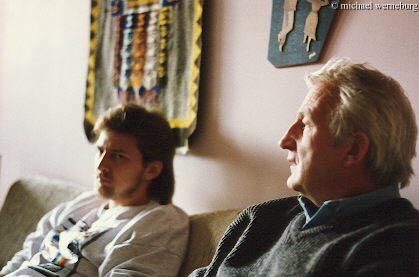
Toward the end he mellowed, of course. But he never seemed to grasp that feeling emotions around us was OK, and that if he felt an emotional response he should let that happen. I never heard him express any pride in us or love for us until I sicced a secret weapon on him: I had my then-four-year-old daughter run up to him and say, "I love you Opa!" He responded, "I love you, too," and that was how I learned he could say the words.
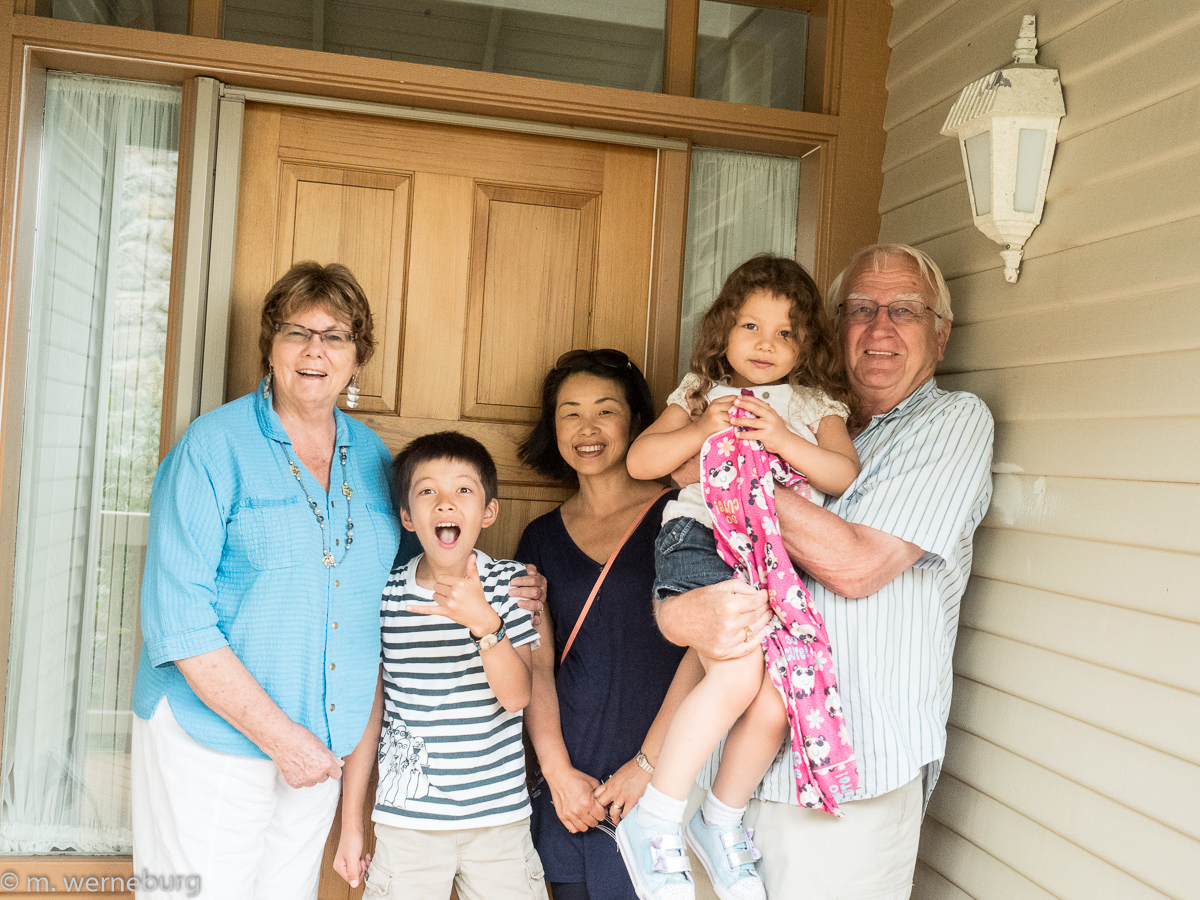
on fatherhood
My dear friend Arnon pointed out that my father was doing what he could with precious little material to work with. His drunken hell-raiser of a father had given him no insights, and my father's generation tended to pursue their own passions wherever they led. My father was by no means alone in de-prioritizing the family, or in his resentments or his inability to connect. He was probably closer to the norm in those days.
I've tried to make a lot of decisions based on the counter-examples of my father and grandfathers. The two grandfathers expressed a lot of regret at the end, and I took some of the things my maternal grandfather to heart - such as not putting work before family. My own father was quite incapable of imparting anything heartfelt (his dying advice was, "Don't let the bastards get you down!") but I do believe that I've corrected for several things that I found hurtful or aggravating. Specific examples include:
- Setting aside my own hobbies as needed through the years. This means being around.
- Treating the special health considerations of my children seriously instead of dismissing them and ridiculing them.
- Correcting for behaviors, not attacking the child. I've never told my kids they were worthless, weak, liars, or lazy.
- Helping the kids understand the context of other people, other walks of life, etc. I had a working class childhood but that doesn't mean I've carried any of that resentment and tribalism forward.
- Putting my son through private school when we arrived in Japan, rather than forcing him to thrash about in the public system. We spend more in a year than my tuition cost for both degrees. There's no question that the investment is worth it.
- Committing to my marriage.
- Celebrating the kids' wins.
- Communicating my love and pride and respect.
In a lot of this I have the example of my mother and my paternal grandmother.
final word
My father was a difficult man and father, who had a lot to share with the world but no ability to deal with those close to him. I was very grateful that he was able to remarry and find a happy life for more than twenty years with a new family. I was also very proud of his work and his contributions to soaring. And as I've said, he inspired me in a lot of my interests.
I can't undo the 'chaos' of my upbringing (to use a psychologist's words, around 1998) but I can acknowledge everything that my father (and all my ancestors) went through, which made them what they were. And I do have the ability to "pay it forward" to my own kids, so I do. Parenting is insanely difficult and you can only do so much but I'll do it.
An obituary has been published here.